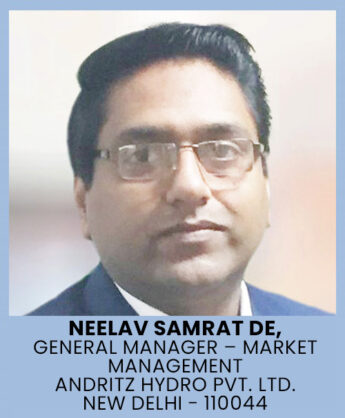PUMPED STORAGE PLANTS; THEFUTURE OF INDIA’S ENERGY STORAGE
By EPR Magazine Editorial June 3, 2023 3:38 pm IST
By EPR Magazine Editorial June 3, 2023 3:38 pm IST

The relevance of PSPs in addressing India’s storage needs, their function in grid balancing, and the necessity for integration with renewable energy sources in the “Green Corridor” are all discussed in this article.
With the advent of renewable energy capacity addition in India to meet its target of 500 GW by 2030, the need for grid reliability and stability is of utmost importance. Pumped storage hydropower plants (PSP) are well proven to be the most cost-effective form of energy storage to date. Today, more than 150 GW of pumped storage capacity is installed throughout the world.
Currently, Greenko, one of India’s largest independent power producers and the leading energy solution provider in the changing energy landscape of India, is executing India’s first fully integrated renewable energy project (IRES), where the electro-mechanical equipment is being supplied for the Pinnapuram PSP (1680 MW) located in Andhra Pradesh.
India has been leading the clean and green energy agenda, and as part of its COP21 commitment, it intends to increase the capacity of renewable energy sources in the energy mix. India targets achieving a renewable installed capacity of 500 GW by 2030. By 2040, it intends to increase the share of renewable installed capacity to 50 percent of the overall generation capacity. And by 2070, it targets attaining net-zero status.
Power generation nowadays is characterised by the following features: steeper ramping, lower turndowns, shorter peaks, and the variability and unpredictability of solar and wind energy.
Hydro-pumped energy storage (HPES or PSP) is one of the most proven technocommercially viable long-distance energy storage solutions. Globally, the PSP’s installed capacity is in excess of 160 GW, which practically makes up the entire storage capacity globally.
Hydro-pumped energy storage includes two water reservoirs at different elevations that can generate power as water moves down from one to the other (discharge), passing through a turbine. PSP projects are typically classified as on-stream and off-stream based on whether both reservoirs or either one or none of them are part of an existing riverine system.
Hydro-pumped storage is presently more than a 95 percent make-in- India solution and provides over 100 years of mature technology, multi-GW scale, indigenousness, and the lowest cost solution with the least life cycle environmental impact. This is a mature technology that has been in operation for more than 100 years now and is well proven, durable, and reliable.PSPs: The need of the hour Pumped storage power plants (PSPs) are crucial for several reasons. Firstly, the rapid growth of renewable energy in the grid necessitates increased storage capacities, estimated at 16 GW by 2030. To address this, immediate action is essential, requiring a storage solution that offers bulk storage, maturity, and low risk.
Among the available technologies, pumped storage is the most mature option currently. Therefore, it should be prioritised for implementation to meet the identified capacity needs promptly. Incentivising pumped storage is necessary until the initial targets are met.
PSPs play a vital role in grid balancing; particularly as renewable energy becomes dominant in the grid. Recognising pumped storage as a grid asset allows investments to be capitalised as transmission assets. By incrementally increasing wheeling charges, the investment becomes viable and attracts financing.
Integrating PSPs with Regional Load Dispatch Centers optimises the utilization of renewable energy, minimising curtailment. Additionally, introducing tariffs for ancillary services ensures financial viability for the generating companies (GENCOS) by improving access to financing. Many developing nations are already moving in this direction.
To balance renewable energy effectively, PSPs should be integrated into the “Green Corridor.” Studying the impact of this integration is crucial, as locating balancing storage near renewable energy sources is ideal due to limited interconnection between regions.

We use cookies to personalize your experience. By continuing to visit this website you agree to our Terms & Conditions, Privacy Policy and Cookie Policy.